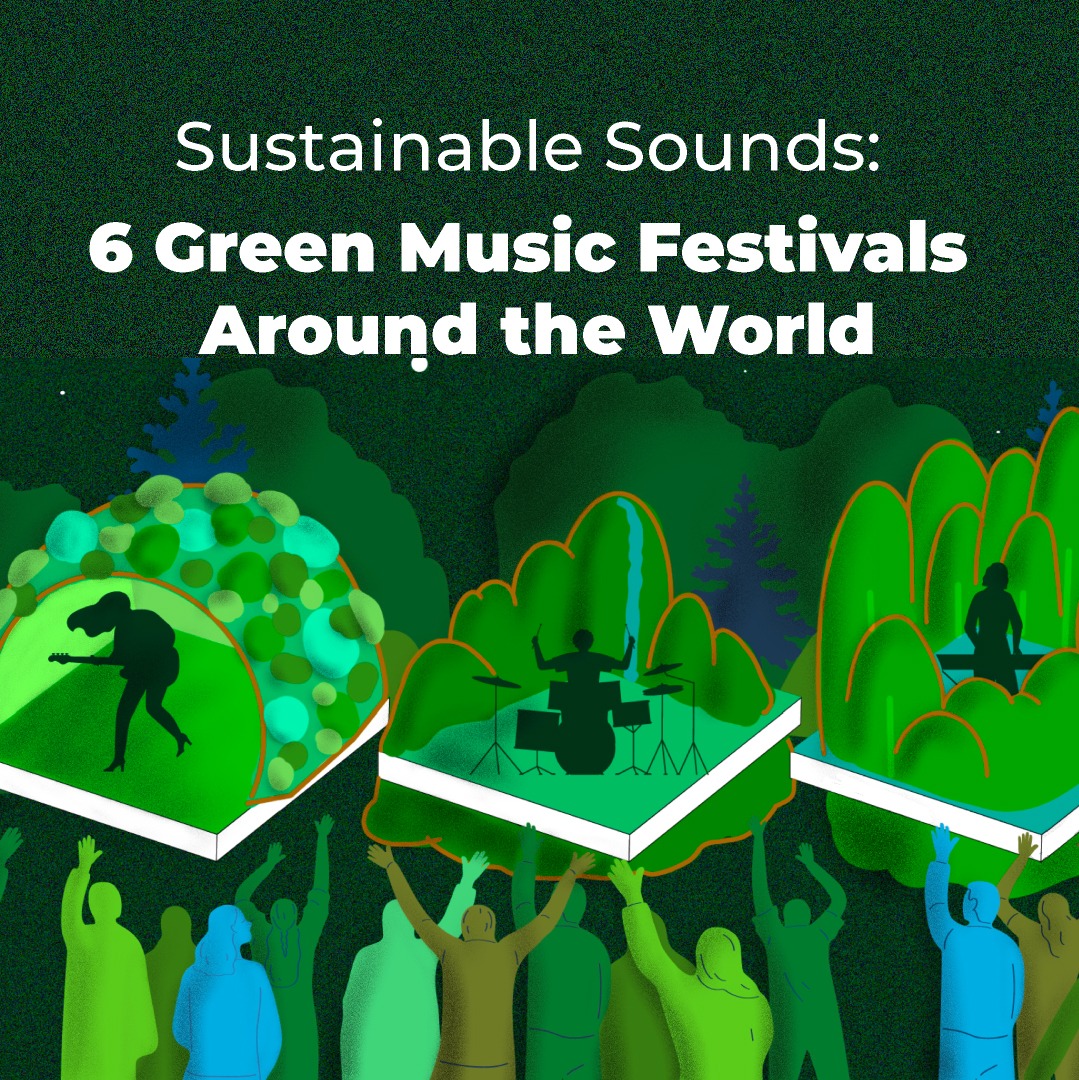As global concern for sustainability continues to rise, industries of all kinds are reevaluating their practices. Among these, music festivals – often notorious for their environmental impact – have emerged as a focal point for eco-friendly innovation. From reimagining waste management to harnessing renewable energy, festivals across the globe are embracing sustainable practices at an unprecedented pace.
In this article, we spotlight some of the most “green” music festivals around the world and the inventive solutions and transformative initiatives that are reshaping the landscape of live music while reducing ecological impact. Join us as we celebrate the pioneering efforts driving the movement towards greener, more environmentally conscious celebrations of music.
Hillside Festival (Ontario, Canada)
Hillside Festival, based in Guelph, has long been held as a gold (or should we stay green) standard in Canada. Its sustainable initiatives have been part of the festival’s ethos since its inception 40 years ago and it has received awards including “Best Green Operations” from Canadian Music Week and the International Clearwater Award.
Some of its environmental efforts include:
- The “Living Roof” – a green roof atop their Main Stage, which provides an array of benefits such as improving air quality, providing insulation, filtering heat, absorbing air pollution, and adding oxygen to the atmosphere.
- Reusable dishware and glassware, as well as on-site solar-powered dishwashing
- “Trash Turnaround” stations for compost, recyclables, and dirty dishes
- Subsidized shuttle busses running throughout the festival
- Free water from the “Water Wagon”
Boom Festival (Castelo Branco, Portugal)
Located in Idanha-a-Nova, the Boom Festival is arguably one of the world’s leaders in terms of sustainable practices, with numerous accolades to its name. Most recently, it was nominated in 5 out of 9 categories for the 2024 ‘A Greener Future’ (AGF) Awards, taking home the prize for Water & Sanitation. Last year, it won the European Festival Awards’ Green Operations Award.
One area where they have carved the way for other large scale events is through implementing compost toilets. This practice saves water (19 million liters over the course of their 8-day festival!), creates organic fertilizer and compost soil, and is chemical free.
They have a number of other impressive programs and initiatives, such as using eco materials and procedures for all construction purposes, offering local and organic food options (85% of which are vegetarian/vegan), a reforestation program, using solar energy to power the majority of their daily needs, and much more.
Strawberry Fields (East Gippsland, Australia)
Currently based in “The Wildlands” by the famous Murray River, this festival boasts customized sustainable infrastructure in one of Australia’s most beautiful natural environments.
Strawberry Fields was also awarded AGF’s Water & Sanitation Award, in 2020, after launching a 100% reusable crockery system (i.e. dishes, platers, cups) called the “Rewash Revolution”. They achieved this by implementing a $4 sustainability charge per ticket, which virtually paid for the system entirely, and also required patrons to pay a $4 deposit when purchasing food or drinks to ensure that they would return their dishware to the washing station. Even more impressive: despite a 20% increase in attendees between 2018 and 2019, the overall waste generated was reduced by 30%.
The festival is also known for implementing 100% composting toilets, and integrating eco-friendly gardens with greywater filtration systems (taking non-fecal water from showers, sinks, washers, etc. and reusing that water for irrigation and other purposes).
Paradise City Festival (Perk, Belgium)
This festival boldly dubs itself as “one of the most sustainable festivals in the world” – and with good reason. Sustainability is at the core of their ethos and their efforts have been recognized by AGF, earning its International Greener Festival Award (the top prize) and Greener Catering Award, among numerous other nominations.
Their list of green activities and programs is extensive: electric shuttle bus service, high parking fees, 100% LED technology for light sources, vacuum toilets to save water, deposits for camper waste collection and reusable dishware (which are donated to River Cleanup when forfeited or voluntarily contributed). They also offer 100% vegetarian food to reduce carbon emissions (with a super cool CO2 calculator in the food court), a stage that is 99.22% powered by solar energy, and algorithm-controlled generators that minimize excess energy consumption.
A particularly interesting solution is their commitment to only booking international artists who are already touring in Europe in order to limit air travel, as well as having Belgian artists make up a large portion of their lineup (40% in 2022). The festival also has an Ecological Charter for its production suppliers and a Food Truck Agreement that ensures the use of local and seasonal products.
Echoes of Earth (Goa, India)
As a country, India is a leader in environmental stewardship and, in 2019, was ranked third in Asia by Refinitiv’s (now LSEG) annual sustainability report. Each year, Echoes of Earth continues to uphold its title as the country’s greenest music festival and one of the industry’s leading pioneers worldwide by keeping the environment at the core of their operations.
Using the concept of “circular design”, the festival repurposes materials from prior editions to create new assets, such as signage and art installations. In fact, 80% of the festival’s build (including stages) is made from recycled, up-cycled, and discarded media. Think scrap, bamboo, drainpipes, cloth, and metal – all expertly used to design three of their stages, while another is solar-powered.
The festival also offers conservation education through workshops and other programs that extend even beyond the 3-day festivities. A month prior to the 2024 festival, Echoes of Earth held an event with local conservation experts called ‘Ensemble of the Wild: An Evening of Art, Culture, Music and Meaningful Conversations Around Conservation’, which explored the biodiversity of Western Ghats and ecosystems of Goa. They also launched their Greener Side Campaign, a series of eight workshops and activities facilitated by experts on Goa, and hosted an e-biking tour of Divar Island to promote regenerative tourism in celebration of National Tourism Day.
Green Man Festival (Brecon Beacons National Park, Wales)
Green Man is a founding supporter of Vision 2025 – a network of outdoor events and businesses dedicated to achieving “net zero” – and has pledged to reduce their environmental impact by 50% by 2025. Here are just some of the cool ways in which they’re moving towards this goal:
- Transportation: They offer direct coach travel to the festival from around the UK, and encourage other methods of sustainable transportation by offering free shuttles from the train station, free lockable storage for bikes, and a carpool service. They have also teamed up with Ecolibrium to donate £1 from each car parking ticket sold, to help mitigate the impact of travel emissions.
- Waste: In collaboration with Help Refugees and Newport to Calais Aid Collective, they will collect unwanted, unbroken camping equipment from attendees at the end of the festival via drop off points to then donate to refugees around the world.
- Toilet facilities: In addition to moving to composting toilets, the festival now works with Peequal to provide eco-friendly squat urinals for womxn, which produce 98% less CO2 than porta-potties (and reduce bathroom wait time!).
- Power: This year, the festival’s energy will come from either solar power, hydrogen, or hydrotreated vegetable oil (HVO – a fossil-free alternative to diesel).
– Final Notes –
You may have noticed a lack of U.S.-based festivals mentioned in this article. While there are some that are certainly making efforts to improve their environmental impact, sustainability is not yet at the core of festival culture in America in the way that we are seeing in other countries.
Though banning single-use plastics and offering water refills is an important step, it is crucial that festival attendees continue to hold these organizations to even higher standards in order to really see the change that our environment needs. The festivals leading this movement are finding highly innovative solutions to overcome the complex challenges that are inevitable for events of this size and nature, and it’s that kind of daring dedication that we need more of in this industry. Kudos to the fearless leaders!
Be sure to check out our article on Sustainability in Music: How the Industry is Going Green.
Written by Andria Piperni
Illustration by Holly Li




















